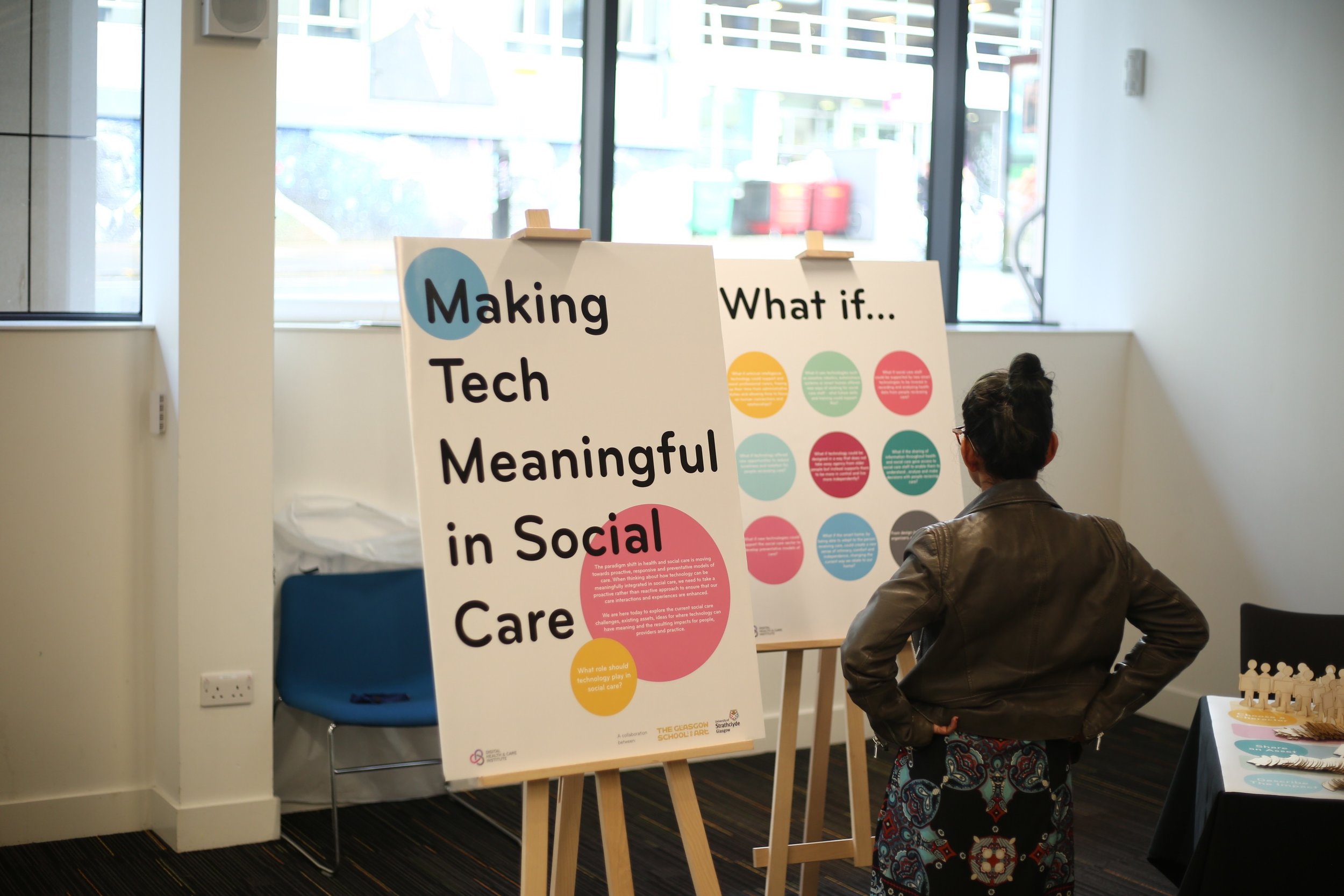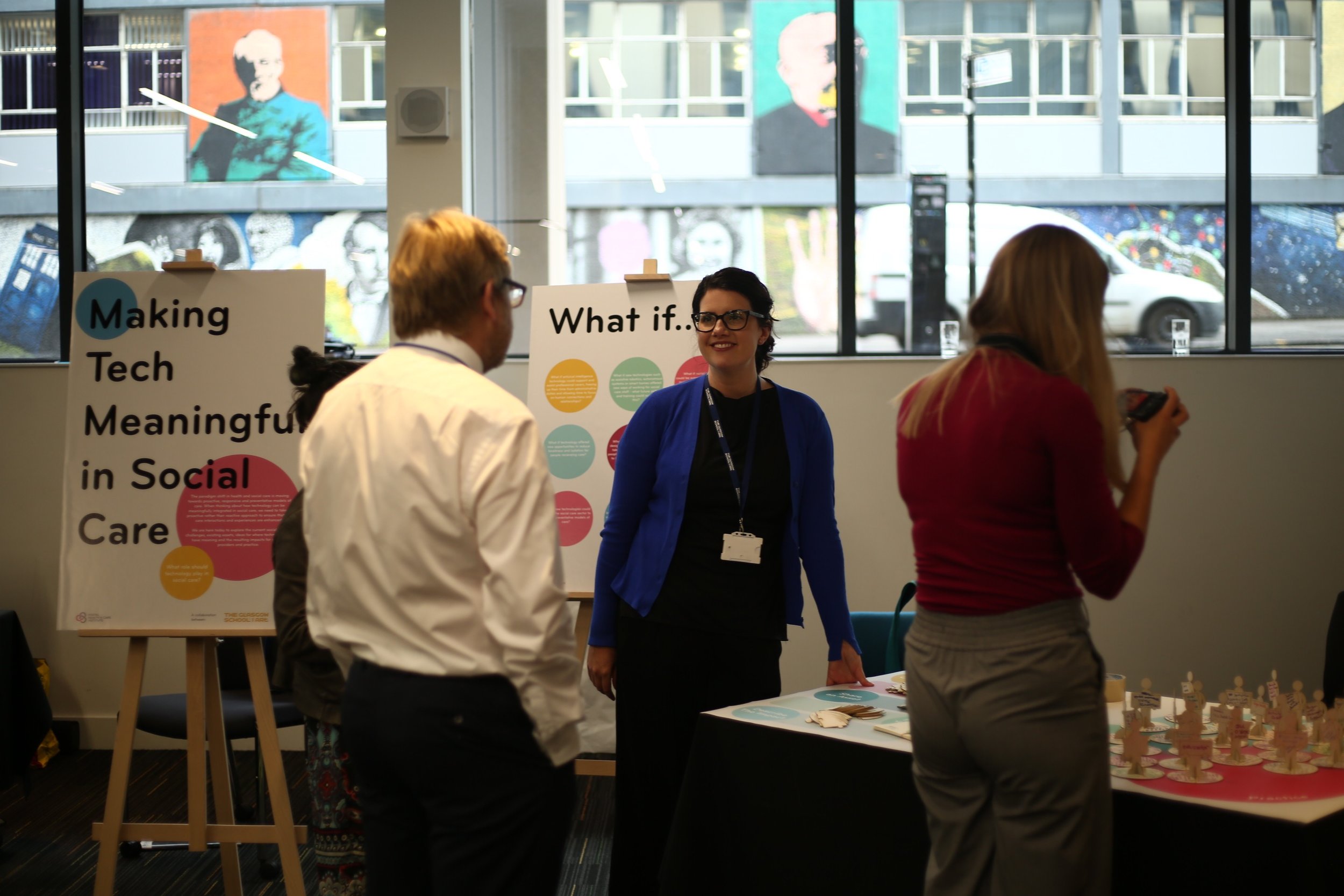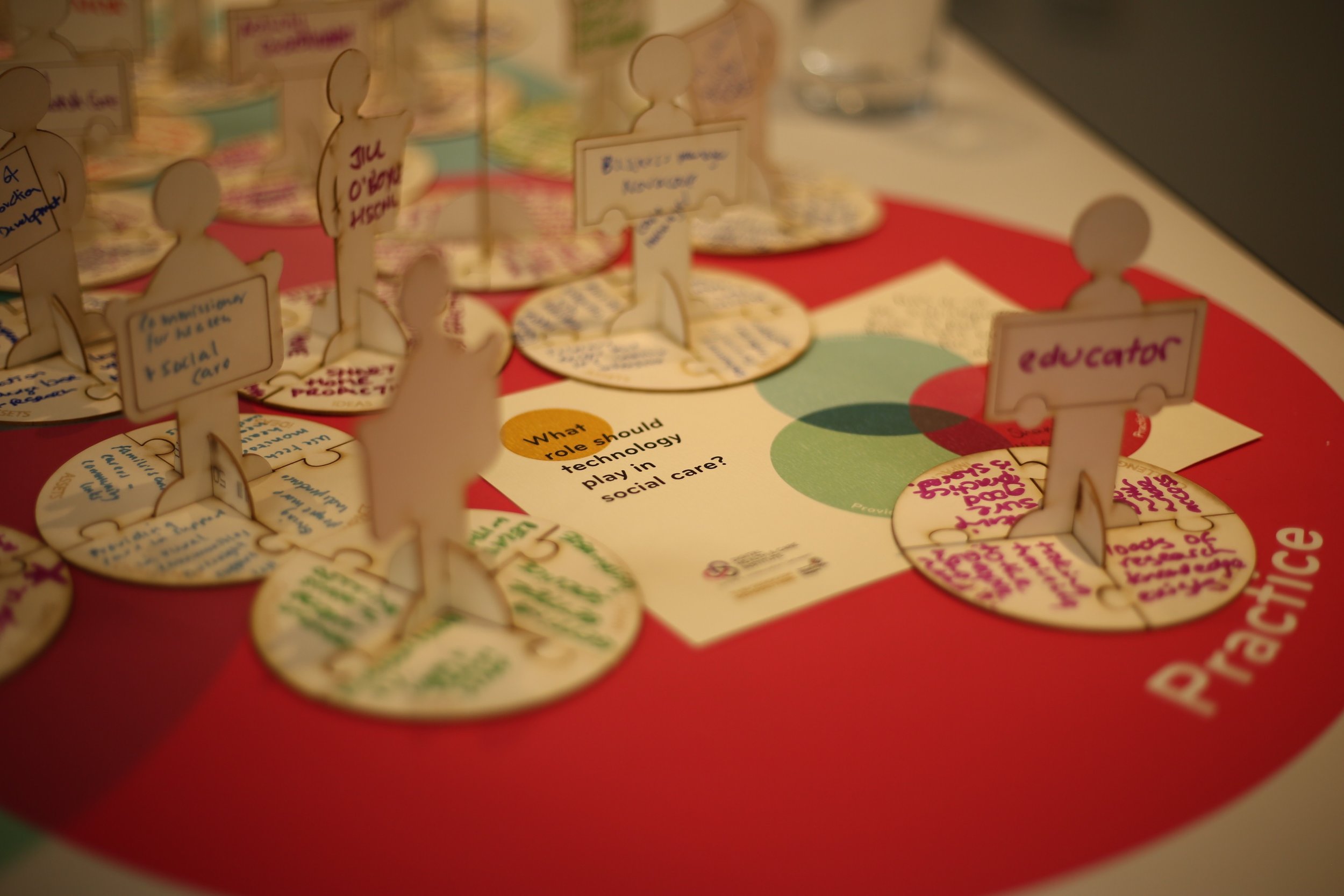MAking technology meaningful in social care
The paradigm shift in health and social care is moving towards proactive, responsive and preventative models of care. When thinking about how technology can be meaningfully integrated in social care, we need to take a proactive rather than reactive approach to ensure that our care interactions and experiences are enhanced.
The recent 'Tech Rights' report (Macaskill, 2018) published by Scottish Care provides an overview of the current landscape of the use of technology in social care, as well as key recommendations towards developing an ethical and rights based approach as we progress design and development of technology in this context.
To build an understanding of the areas of opportunity for technology in social care in Scotland, we explored the challenges, insights and experiences of people involved in the social care context at a technology event organised by Scottish Care. We captured perspectives around the role of technology for the person, providers and practice.
Aim
To explore the current social care challenges and existing assets that can help identify ideas for where technology can have meaning and positive impact for people, providers and practice.
Participants were engaged around the key question: What role should technology play in social care?
approach
The approach aimed to provide a creative context through which the experience of those participating could be acknowledged, understood and developed, resulting in a clearer understanding of the challenges and associated areas of opportunity. We held a pop-up designed engagement and workshop at the event.
Pop-Up Engagement
A pop-up approach was employed to engage delegates attending the 'Tech Care' event to share their challenges, assets, ideas and impacts for where technology should be meaningfully integrated in social care. Participants were also invited to share insights by responding to a series of ‘what if?’ questions designed to support exploration of the future role of technology in social care, adapted from a previous project.
Workshop: demonstration and simulation
We held a workshop in our Demonstration and Simulation environment at the Digital Health and Care Institute to present our innovation approach and share examples of work. Participants were invited to reflect on the demonstrations presented which included: a data sharing environment informed by a project (Backpack) designed to explore the notion of a person-owned data store as the point of integration for ‘ permission based’ information sharing and 'Silverbook', a framework designed to support information sharing with family members of older adults. Participants shared their feedback and reflections during a facilitated discussion to identify areas of future opportunity.
Findings
We engaged with 26 people during the pop-up from a range of backgrounds including frontline care home and care at home staff, providers, third sector, industry and health and social care partnerships.
emerging themes
The insights generated during the pop-up and workshop were analysed thematically through a process of clustering and synthesis which led to a number of key themes relating to people, providers and practice in social care, and the challenges, assets, ideas and impacts for technology.
Prevention and personalisation
The way in which technology could be used to enable prevention and personalisation of care was a key theme that emerged from both the pop-up engagement and the workshop. Participants highlighted the current shift towards supporting people to self-manage and live independently and described the ways in which technology could enable a preventative model of care. Opportunities for live managing of care resources and the predictive capability of technologies could provide ways to feedback to people in their own homes and also share information with family members (based on consent) to initiate any required changes in care and support people to self manage. Enabling information sharing (exploring ‘live chat’ type programmes) could also ensure appropriate response to care needs and lead to enhanced efficiency through better targeting where care is needed and when. Participants emphasised the need to ensure transparency in who holds the information and how information is currently being used. Different systems have different ways of working and, as a result, use different technology.
Giving OWnership
Technology was also seen as a way to give ownership to people in their everyday life. Participants commented that people are keen to manage their own life and there is a need to ‘allow people to have ownership over their own life’. Issues around consent and data protection barriers from IT departments were discussed with participants emphasising the need for people to have control over their own data. Participants described the ways in which giving ownership through technology would allow autonomy and independence leading to higher quality, personalised services.
Challenges, assets, ideas and impact
Participants recognised a key role for technology in supporting people to live independently and sustain connection with families and the community, building confidence and potentially reducing social isolation and depression. It was also suggested that technology may lead to positive impacts on dignity at the end of life. Technology such as Virtual Reality, ‘Storiicare’ and in home technologies were suggested as ideas for ways in which technology may help to overcome challenges. The role of technology in planning care was highlighted to support people to receive care at home or in a community setting. Participants acknowledged that technology could lead to positive economic impact by supporting efficient, sustainable services and ‘free up money so people get [the] support they need’.
The ability of technology to enable sharing and recording of information could allow for better shared decision making and provide a way to capture and build evidence required (e.g. for the Care Inspectorate). Participants also suggested that technology could enable the sharing of good practice and support meaningful learning, allowing people to be better informed. However, it was emphasised that there is a need to get the technology right and deploy this appropriately in order to support a responsible use of technology. In addition, the role of technology to support recruitment in social care and allow for staff to feel ownership and involvement in service redesign activity were also highlighted. It was also suggested that technology could play a key role in education and training and enable this at a distance.
Many of the assets and resources shared that could support challenges related to technologies that already exist or are in development such as Attend Anywhere and Anticipatory Care Plans. Participants also highlighted the importance of people (the workforce, families, carers and communities) and trusting relationships as key assets, as well as the existing research and innovation knowledge base that can help to support how technology can be meaningfully integrated in social care.
Summary
The findings of the pop-up and workshop suggest that technology can play an important role in enabling social care through the insights and ideas highlighted above. There is a need to further explore the role of technology by engaging with key stakeholders involved in social care across Scotland, people receiving and providing care, families, and the academics and industry partners who hold existing knowledge around research and developments in this space. Developing understanding and dynamically prototyping ideas through co-design will enable exploration of the way in which technology can develop and support new ways of working, enable quality interactions between people and families and their care providers, support people to transition and navigate care pathways, and support people to self manage. By addressing each of these areas we can create a future roadmap for how to meaningfully integrated technology in social care at scale.
For more information:
Dr. Tara French | t.french@gsa.ac.uk
Angela Tulloch | a.tulloch@gsa.ac.uk
Visuals credit: Sean Fegan and Angela Tulloch
The DHI is a collaboration between the University of Strathclyde and the Glasgow School of Art.
To cite this report:
French, T. and Tulloch, A. (2018). Making technology meaningful in social care. Scottish Care ‘Tech Care’ Event. Technology Innovation Centre, University of Strathclyde. Available from: https://www.futurehealthandwellbeing.org/making-tech-meaningful-in-social-care/








![techcare_findings-04[2].png](https://images.squarespace-cdn.com/content/v1/5ab504e77c9327e5eed2778a/1541720361678-G174GFRTL9K0V4F3U70V/techcare_findings-04%5B2%5D.png)
